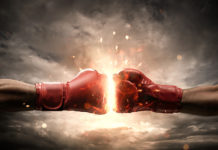Even in its earliest days, discord was part and parcel of American life. During the American Revolution, families were often divided between Patriots — pushing for American independence from Great Britain — and Loyalists. But there was only one Benedict Arnold.
No Loyalists fought alongside the British at Lexington and Concord.
President Thomas Jefferson’s first inaugural captured the spirit of national unity: “But every difference of opinion is not a difference of principle. We have called by different names, brethren of the same principle. We are all Republicans, we are all Federalists. If there be any among us who would wish to dissolve this Union or to change its republican form, let them stand undisturbed as monuments of the safety with which error of opinion may be tolerated where reason is left free to combat it.”
The nation fractured over slavery as Mr. Jefferson portended: “I tremble for my country when I reflect that God is just, that his justice cannot sleep forever.” Abolitionists were tarred and feathered. Abolitionist literature was banned from the U.S. mails. The House of Representatives introduced a “gag” rule to prohibit the receipt of abolitionist petitions.
Newspaper editor and journalist Elijah Lovejoy was assassinated by the slavocracy. The Underground Railroad, used by Harriet Tubman, was born to evade the cruel Fugitive Slave Act.
On April 12, 1861, the Civil War erupted with the firing on Fort Sumter by the Confederacy.
Confederate Vice President Alexander Stephens rejoiced that the Confederacy was the first nation in the world founded on the principle of white supremacy. The rejoicing ended when Robert E. Lee surrendered to Ulysses S. Grant in Appomattox, Virginia.
But the struggle to honor the Declaration of Independence and Civil War Amendments to the Constitution continued for a century. The Ku Klux Klan, created in 1865, was led by Nathan Bedford Forrest with the mission of terrorizing and terrifying Blacks from enjoying their unalienable rights to life, liberty and the pursuit of happiness. The KKK’s signature was lynching and cross burning. Jim Crow remained in the saddle until Dr. Martin Luther King Jr. and the modern civil rights movement arrived. Jackie Robinson did not break the MLB color line until 1947, and he confronted vile hate speech and taunts.
World War I witnessed widespread hysteria. Free speech opposing the war and its extension to crush the Bolshevik Revolution was treated as a crime. Presidential candidate Eugene Debs was dispatched to prison. Anyone with a German-sounding name was persecuted. Hyphenated Americans were suspected. President Woodrow Wilson poured fact-free venom on naturalized citizens: “There are citizens of the United States, I blush to admit, born under other flags but welcomed under our generous naturalization laws to the full freedom and opportunity of America, who have poured the poison of disloyalty into the very arteries of our national life; who have sought to bring the authority and good name of our Government into contempt, to destroy our industries wherever they thought it effective for their vindictive purposes to strike at them, and to debase our politics to the uses of foreign intrigue.”
During World War II, the nation unified around Japanese American concentration camps based on the Orwellian conviction that the absence of espionage or sabotage proved Japanese American treason was afoot. As Justice Robert Jackson observed in West Virginia State Board of Education v. Barnette:
“Probably no deeper division of our people could proceed from any provocation than from finding it necessary to choose what doctrine and whose program public educational officials shall compel youth to unite in embracing. Ultimate futility of such attempts to compel coherence is the lesson of every such effort from the Roman drive to stamp out Christianity as a disturber of its pagan unity, the Inquisition, as a means to religious and dynastic unity, the Siberian exiles as a means to Russian unity, down to the fast failing efforts of our present totalitarian enemies. Those who begin coercive elimination of dissent soon find themselves exterminating dissenters. Compulsory unification of opinion achieves only the unanimity of the graveyard.”
We seem to learn nothing and forget nothing. Today, a difference of opinion is treated as treason. Compromise — the coin of a democratic realm — is scorned. Rep. Thomas Massie (R-Ky.) is ostracized and condemned by his own party for voting his conscience to downsize government, including the multitrillion-dollar military-industrial-security complex that inflates fear manifold to justify the sprawling American empire.
One Civil War costing more than 600,000 lives is one too many. We need to step back from the abyss and recognize that free speech does its best work in protecting speech that we hate. We cannot afford the Micawberish conviction that our fierce divisions will be healed by a biblical miracle.































